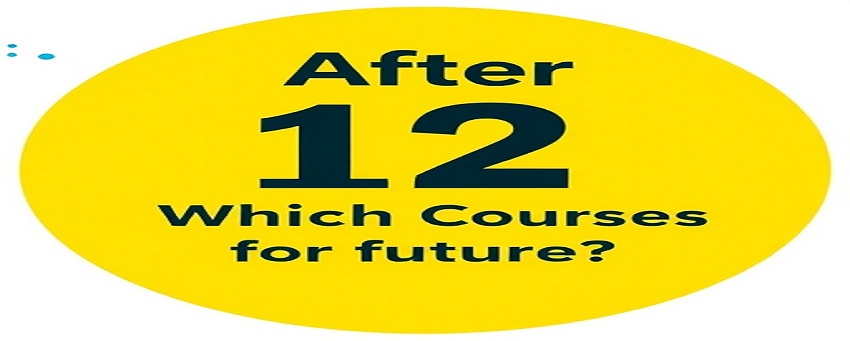After 12th Which Course is Best for Future?
After 12th Which Course is Best for Future?. The journey after 12th grade can often feel overwhelming for students. With numerous options available in various fields, choosing the right course can significantly influence your career trajectory. Whether you envision yourself in a corporate office, a creative studio, or a laboratory, the right educational path is crucial for your future.
Thank you for reading this post, don't forget to subscribe!In this blog post, we’ll explore several popular courses after the 12th grade, their prospects, and how to choose what’s best for you.
Understanding the Landscape of Courses After 12th
Before diving into specific courses, let’s understand the different streams—Science, Commerce, and Arts—upon which many higher education options are built.
- Science Stream: Students with a keen interest in mathematics or biology often choose this stream. This path is prominent for students aspiring to fields like engineering, medicine, or pure sciences.
- Commerce Stream: This stream is ideal for students interested in business, finance, and economics. It lays the groundwork for careers in accounting, business administration, and related fields.
- Arts Stream: The Arts stream offers a broad range of subjects designed for students interested in humanities, social sciences, and creative studies. It can lead to careers in education, journalism, design, and more.
Now let’s delve into some of the best courses available for each stream and their future prospects.
Best Courses After 12th Science
1. Engineering (B.E/B.Tech)
Overview: Engineering is one of the most sought-after courses for Science students. Various specializations are available, including Computer Science, Mechanical, Civil, and Electrical Engineering.
Prospects: Engineering graduates are highly regarded by employers. With the rise of technological innovations, the demand for engineers is consistently high. Career opportunities include software development, project management, and consultancy.
2. Medicine (MBBS/BDS)
Overview: If you have a passion for helping others and a strong aptitude for sciences, pursuing a career in medicine can be rewarding. The MBBS (Bachelor of Medicine and Bachelor of Surgery) program is highly competitive.
Prospects: A career in medicine comes with stability, respect, and excellent earnings. You can work in hospitals, private clinics, or enter research fields.
3. Pharmacy (B.Pharm)
Overview: A Bachelor in Pharmacy prepares students for a career in drug design, dispensing, and regulation.
Prospects: Pharmacists are increasingly in demand due to the pharmaceutical industry’s growth. Roles include clinical pharmacy, research and development, and regulatory affairs.
4. B.Sc (Various Specializations)
Overview: A Bachelor of Science degree can range from Physics and Chemistry to Environmental Science and Biotechnology.
Prospects: B.Sc graduates have options in research, education, and various industries. Specializations like Biotechnology and Environmental Science are particularly promising due to growing global concerns.
Best Courses After 12th Commerce
1. Bachelor of Commerce (B.Com)
Overview: B.Com is a foundational degree for any career in business and finance.
Prospects: Graduates can pursue careers in accounting, taxation, and business management. Specializations like B.Com (Honors) or B.Com with professional courses (like C.A. or C.S.) further enhance job prospects.
2. Bachelor of Business Administration (BBA)
Overview: BBA focuses on business management principles.
Prospects: BBA graduates can work in various sectors, including marketing, finance, and human resources. Many opt for an MBA after completing their BBA for advanced career opportunities.
3. Hotel Management
Overview: This course prepares students for the hospitality and tourism industry.
Prospects: Graduates can work in hotels, restaurants, and events management. The tourism sector’s growth leads to numerous job opportunities in this field.
4. Chartered Accountancy (CA)
Overview: CA is a professional course that prepares students for a career in accounting, taxation, and finance.
Prospects: CA is highly regarded in the commerce field, leading to roles in auditing, taxation, and corporate finance. The course path is challenging but rewarding.
Best Courses After 12th Arts
1. Bachelor of Arts (B.A)
Overview: A B.A. degree encompasses a range of subjects, from literature and history to sociology and psychology.
Prospects: Graduates can pursue careers in teaching, journalism, public relations, or social work. Further education like M.A. can enhance job opportunities.
2. Design Courses (Fashion, Interior, Graphic)
Overview: Courses in design cater to creative individuals wanting to excel in fields like fashion design, interior design, or graphic design.
Prospects: The design industry is booming, and graduates can work with fashion brands, design firms, or even freelance.
3. Journalism and Mass Communication
Overview: This course prepares students for careers in media and communications.
Prospects: With the rise of digital media, careers in journalism, public relations, and broadcasting are expanding.
4. Hotel Management and Travel & Tourism
Overview: Similar to Commerce students, Arts students also have the option to pursue courses in hospitality and tourism.
Prospects: A growing service industry leads to ample job opportunities in management roles in hotels, restaurants, and travel companies.
Factors to Consider When Choosing a Course
1. Interests and Passion
Your individual interests play a crucial role in determining the right path. Ask yourself what subjects you enjoy most and what activities energize you.
2. Career Goals
Consider what your long-term career aspirations are. Research job roles and industries that excite you to help guide your choice.
3. Job Market Trends
Look into the demand for various professions. Graduating in a field with strong job prospects can ensure stability and growth in your career.
4. Higher Education Options
Consider if you wish to pursue further studies after your undergraduate degree. Some professions may require advanced education or specialized training.
5. Financial Investment
Consider the costs associated with various courses, including tuition, materials, and potential lost income while studying. Make financially sound decisions.

Conclusion
Choosing the right course after the 12th grade is imperative for your career success. Whether you come from the Science, Commerce, or Arts stream, there are numerous opportunities to explore. It’s essential to take time to consider your interests, career goals, and market demands before making a decision. Seek advice from mentors, professionals in your field of interest, and use this information to empower your choice. Remember, your education is an investment in your future—make it count!
With the right planning and foresight, you can embark on a path that not only matches your aspirations but also prepares you for a fulfilling career ahead. Good luck with your journey after the 12th.
Here are some frequently asked questions (FAQs) related to choosing the best course after completing 12th grade, along with detailed answers:
FAQs About Choosing Courses After 12th
1. What should I consider when choosing a course after 12th?
When choosing a course after completing 12th grade, consider the following factors:
- Interests and passion: Assess what subjects you enjoy and what careers excite you.
- Career goals: Think about your long-term career aspirations and whether a particular course aligns with that vision.
- Job prospects: Research job market trends and the demand for professionals in your field of interest.
- Higher education opportunities: Determine if you want to pursue further studies and if a course offers relevant advanced education pathways.
- Financial implications: Evaluate the costs associated with the course, including tuition fees and potential student loans.
2. Are there good career options in Arts after 12th?
Yes, pursuing a course in the Arts stream can lead to successful careers in various fields. Potential career paths include:
- Journalism and Mass Communication: Roles in media, broadcasting, and public relations.
- Design: Opportunities in graphic design, fashion design, and interior design.
- Social Work: Careers in counseling, community service, and non-profit organizations.
- Education: Opportunities in teaching and educational consultancy.
3. Is engineering still a viable option after 12th?
Yes, engineering remains one of the most popular and viable options for Science students after 12th. With the continued growth of technology, disciplines such as Computer Engineering, Electrical Engineering, and Civil Engineering are in high demand. However, it’s essential to ensure that you have a genuine interest in the subject and are willing to engage with the rigorous curriculum.
4. What are the advantages of pursuing a course in Commerce?
Pursuing a course in Commerce offers several advantages:
- Diverse career options: Graduates can work in fields like finance, accounting, marketing, and management.
- Professional qualifications: You can pursue additional professional courses like CA (Chartered Accountancy) or CS (Company Secretary) to enhance your qualifications.
- Foundation for entrepreneurship: Commerce provides a solid understanding of business principles, which can be beneficial if you plan to start your own business.
5. Can I change streams after 12th?
Yes, you can change streams after 12th; however, it may require additional effort and a strong commitment to learning. For example, if you studied Commerce and wish to pursue a career in Engineering, you may need to enroll in foundation courses or preparatory classes. Switching streams can open new opportunities, but it’s essential to consider the demands of the new field.
6. What job opportunities are available after completing a B.Sc degree?
A Bachelor of Science (B.Sc) can lead to various job opportunities, depending on your specialization:
- Biotechnology: Research roles in labs, pharmaceuticals, or bioinformatics.
- Environmental Science: Careers in environmental consultancy, conservation agencies, or NGOs.
- Laboratory Technician: Positions in hospitals, pharmaceuticals, or research institutions.
- Teaching: Opportunities in schools, coaching centers, or tutoring.
7. How can I prepare for entrance exams after 12th?
Preparing for entrance exams requires dedication and a strategic approach:
- Understand the syllabus: Familiarize yourself with the topics covered in the entrance exam.
- Create a study plan: Develop a timetable aligning your study hours with exam dates.
- Practice past papers: Solve previous years’ question papers to understand the exam pattern.
- Join coaching classes: Consider enrolling in coaching or online courses if additional guidance is necessary.
- Stay consistent: Regular study practices are crucial for retaining information and improving your skills.
8. Can I pursue a professional course while studying for my undergraduate degree?
Yes, many students pursue professional courses alongside their undergraduate studies. For instance, students can begin training for CA while completing their B.Com. However, balancing both can be demanding, so it’s vital to ensure you can manage your time effectively.
9. What is the importance of internships during college?
Internships play a crucial role in enhancing your educational experience. They provide real-world exposure, allowing you to apply theoretical knowledge to practical situations. Internships can help you:
- Gain industry experience: Build skills and understanding of workplace dynamics.
- Network: Establish connections with professionals in your field.
- Enhance your resume: Gain a competitive edge by showcasing your hands-on experience to potential employers.
10. What if I still feel uncertain about my future career path?
Feeling uncertain is common among students at this stage. Here are some steps you can take if you’re unsure:
- Counseling: Seek guidance from career counselors or educational advisors.
- Explore different fields: Take introductory courses in various subjects to see what piques your interest.
- Talk to professionals: Conduct informational interviews with professionals in different industries to gain insight into their daily work.
- Volunteer: Engaging in volunteer opportunities can provide exposure to different fields and help clarify your interests.


